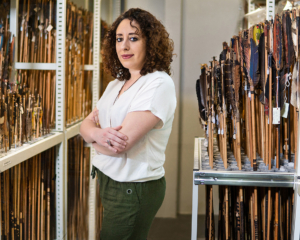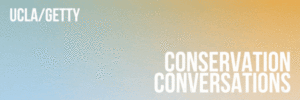Next Conservation Conversations Featuring Ana Carolina Delgado Vieira 5/31 @ 11 AM PT
Title: Exploring Sustainable Conservation Practices: Insights from the Museum of Archaeology and Ethnology (MAE-USP).
Presenter: Ana Carolina Delgado Vieira
Event Date
Friday, May 31st, 2024 at 11 a.m. (PT)
Event Location
Wherever your zoom-compatible device is located
Abstract: For decades, ethnographic museums have treated their collections with pesticides. To preserve organic objects, these institutions used DDT, pentachlorophenol, hexachlorobenzene, and paradichlorobenzene, among other common chemicals.
Due to environmental and health concerns, the use of pesticides in museums became less appropriate in the late 20th century.Currently, the Museum of Archaeology and Ethnology (MAE-USP) is using ionizing radiation to treat objects affected by insects.As well as discussing the factors that influenced the selection of this technique, this presentation highlights the importance of a partnership with the Institute of Energy and Nuclear Research (IPEN) as one of the major contributors to the renewal of traditional gears in ethnographic museums such as MAE-USP.
Speaker Bio: Ana Carolina Delgado Vieira
 Ana Carolina Delgado Vieira holds a bachelor’s and master’s degree in history from the University of São Paulo (USP) in Brazil. She holds a certificate in conservation from the Templo da Arte in São Paulo, Brazil and the Yachaywasi Institute of Conservation in Lima, Peru, specializing in archaeological and ethnographic materials.Since 2008, she has been a conservator at the Museu de Arqueologia e Etnologia (MAE-USP). Her responsibilities include conducting condition surveys of collections and items, performing conservation treatments, and preparing items for exhibition, loan, move, and research. Since 2013, she has been the head of the conservation laboratory.Her research interests include interdisciplinary collaboration, indigenous participation, and how conservators can work collaboratively with indigenous collection originators and descendants to reframe ethnographic traditional museums.Currently, she is a PhD candidate at the Nuclear and Energy Research Institute (IPEN-CNEN/SP) of the University of São Paulo, where she is researching the use of ionizing radiation to preserve cultural heritage.
Ana Carolina Delgado Vieira holds a bachelor’s and master’s degree in history from the University of São Paulo (USP) in Brazil. She holds a certificate in conservation from the Templo da Arte in São Paulo, Brazil and the Yachaywasi Institute of Conservation in Lima, Peru, specializing in archaeological and ethnographic materials.Since 2008, she has been a conservator at the Museu de Arqueologia e Etnologia (MAE-USP). Her responsibilities include conducting condition surveys of collections and items, performing conservation treatments, and preparing items for exhibition, loan, move, and research. Since 2013, she has been the head of the conservation laboratory.Her research interests include interdisciplinary collaboration, indigenous participation, and how conservators can work collaboratively with indigenous collection originators and descendants to reframe ethnographic traditional museums.Currently, she is a PhD candidate at the Nuclear and Energy Research Institute (IPEN-CNEN/SP) of the University of São Paulo, where she is researching the use of ionizing radiation to preserve cultural heritage.
For questions regarding the talk
Contact us at mmrawlins@g.ucla.edu or ckcaraway229@g.ucla.edu
To view recordings of previous talks, please visit the Cotsen Youtube page
As a land grant institution, the faculty and administration at UCLA acknowledge the Gabrielino/Tongva peoples as the traditional land caretakers of Tovaangar (Los Angeles basin, South Channel Islands).


